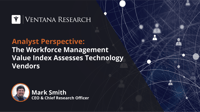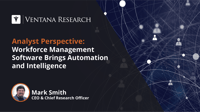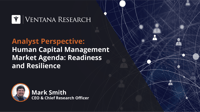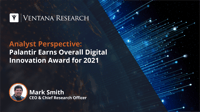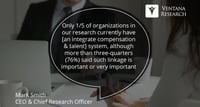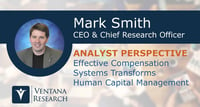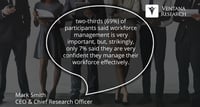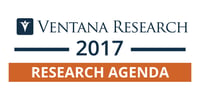I am happy to share insights gleaned from our latest Value Index research, an assessment of how well vendors’ offerings meet buyers’ requirements. The Ventana Research Value Index: Workforce Management 2022 is the distillation of a year of market and product research by Ventana Research. Drawing on our Benchmark Research, we apply a structured methodology built on evaluation categories that reflect the real-world criteria incorporated in a request for proposal to workforce management vendors...
Read More
Topics:
Human Capital Management,
Learning Management,
Talent Management,
Workforce Management,
Payroll Management,
Total Compensation Management,
employee experience
Workforce management processes and activities, a major focus of investment and optimization efforts for decades, have undergone a huge transformation in recent years. In our view, this is mostly a function of two significant trends: the explosion of technology innovation associated with the use of artificial intelligence, machine learning and embedded analytics in many areas of a business including a range of human capital management processes and operations; and a major reframing of the...
Read More
Topics:
Human Capital Management,
Learning Management,
Talent Management,
Workforce Management,
Payroll Management,
Total Compensation Management,
employee experience
Ventana Research recently announced its 2022 Market Agenda for Human Capital Management, continuing the guidance we’ve offered for two decades to help organizations derive maximum potential from workforce- and people-related technology investments and initiatives. In crafting this Market Agenda, we focused on three critical themes top-of-mind for both HCM vendors and buyers: Organizational readiness, workforce resilience utilizing digital technology to increase retention, and advance worker...
Read More
Topics:
Human Capital Management,
Learning Management,
Workforce Management,
Payroll Management,
Total Compensation Management,
employee experience,
candidate engagement
The annual Ventana Research Digital Innovation Awards showcase advances in the productivity and potential of business applications, as well as technology that contributes significantly to the improved processes and performance of an organization. Our goal is to recognize technology and vendors that have introduced noteworthy digital innovations to advance business and IT.
Read More
Topics:
Sales,
Customer Experience,
Human Capital Management,
Marketing,
Office of Finance,
Voice of the Customer,
Continuous Planning,
embedded analytics,
Learning Management,
Analytics,
Business Intelligence,
Collaboration,
Data Governance,
Data Preparation,
Information Management,
Internet of Things,
Business Planning,
Contact Center,
Data,
Product Information Management,
Sales Performance Management,
Workforce Management,
Financial Performance Management,
Price and Revenue Management,
Digital Technology,
Digital Marketing,
Digital Commerce,
Operations & Supply Chain,
Enterprise Resource Planning,
ERP and Continuous Accounting,
Revenue,
blockchain,
natural language processing,
data lakes,
Total Compensation Management,
robotic finance,
Predictive Planning,
employee experience,
candidate engagement,
Conversational Computing,
Continuous Payroll,
collaborative computing,
mobile computing,
continuous supply chain,
Subscription Management,
agent management,
extended reality,
intelligent marketing,
sales enablement,
work experience management,
lease and tax accounting,
AI & Machine Learning,
robotic automation
Compensation and the processes and systems to support it are at the center of success in every organization, as I have noted recently.In our view, an investment in total compensation management software is a strategic step toward advancing human capital management. Our benchmark research on this topic found some progress in attitudes about modernizing compensation practices. Almost three-fourths (72%) of organizations said that it is important or very important to have a total compensation...
Read More
Topics:
Human Capital Management,
Office of Finance,
Learning Management,
HRMS,
Workforce Management,
Work and Resource Management,
ERP and Continuous Accounting,
Payroll Optimization
Compensation management is essential for any organization that values engaging and retaining its employees. It is a fundamental component of a range of personnel-related activities – recruiting and hiring, assessing performance, and career and succession planning. Determining and providing appropriate compensation, which may involve base pay, merit pay, variable pay and incentives or bonuses, is equally important for all members of the workforce – full- or part-time employees, contingent or...
Read More
Topics:
Human Capital Management,
Office of Finance,
Learning Management,
HRMS,
Workforce Management,
Work and Resource Management,
ERP and Continuous Accounting,
Payroll Optimization
Workforce management is a key topic of expertise for Ventana Research. We define workforce management as the set of activities and processes organizations use to manage their hourly and salaried workforce for maximum productivity. It involves not only scheduling, tracking and paying for time worked but also aligning that work to the tasks and objectives of the organization. Workforce management is a critical component of every company’s operations, human resources and overall human capital...
Read More
Topics:
Human Capital Management,
Office of Finance,
Learning Management,
HRMS,
Workforce Management,
Work and Resource Management,
ERP and Continuous Accounting,
Payroll Optimization
Human capital management (HCM) offers a prime opportunity for organizations and their human resource professionals to make employee-related processes effective in engaging and retaining the workforce. Manual administrative processes often hampered HR in focusing on the workplace experience and employee satisfaction. Modern HCM applications can help them manage members of the workforce as critical assets and make continuous investment in people-related processes, deriving insights on issue such...
Read More
Topics:
Human Capital Management,
Office of Finance,
Learning Management,
HRMS,
Workforce Management,
Work and Resource Management,
ERP and Continuous Accounting,
Payroll Optimization
